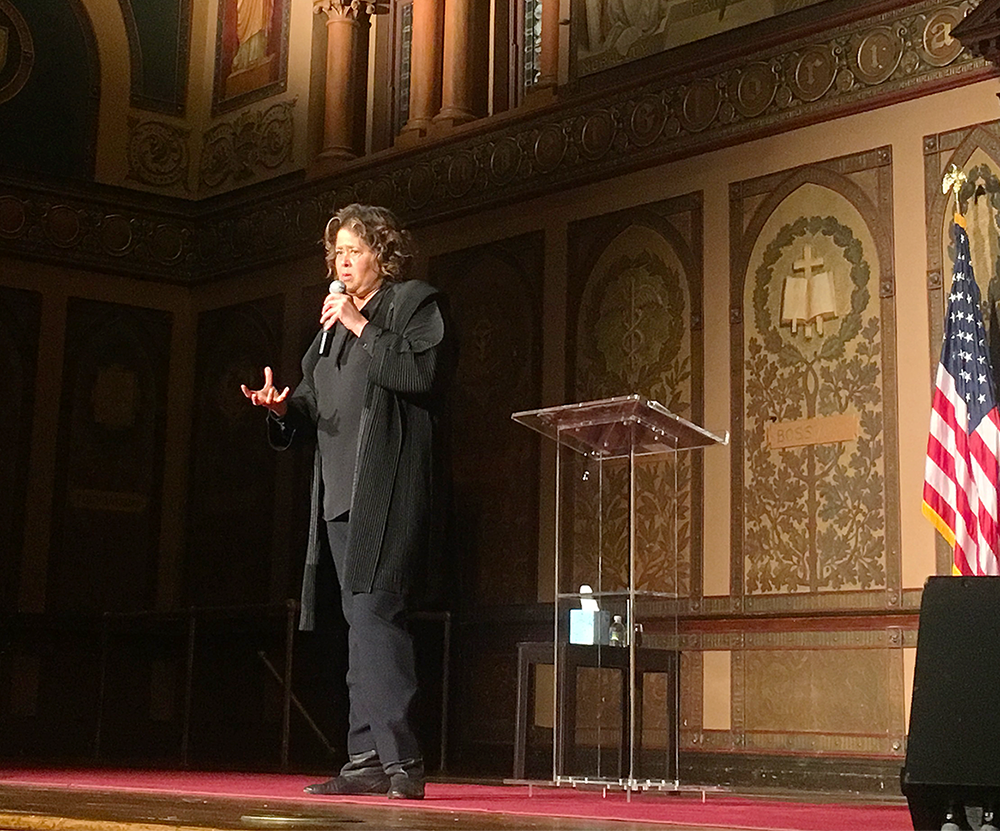
Actress Anna Deavere Smith highlighted the role theater can play in raising awareness for issues affecting underrepresented populations in a Gaston Hall event Jan. 19.
Theater has the power to raise awareness for issues affecting underrepresented populations, as highlighted in a Gaston Hall event featuring actress Anna Deavere Smith hosted by the Office of the President on Jan. 19.
Smith discussed her Pipeline Project, which uses theater to highlight issues within the school-to-prison pipeline. The event Doing Time in Education: The School-to-Prison Pipeline was a lecture and performance followed by a question-and-answer session, with Smith moderated by University President John J. DeGioia.
A professor at the Tisch School of the Arts at New York University and artist-in-residence at the think tank Center for American Progress, Smith performs using a method of theater of her own invention, in which she takes on the persona of people whom she has personally interviewed. Smith has interviewed 253 people for her performances.
Smith performs the conversations as authentically as she can, including the specific body language, tics and speech patterns of her subjects. With this technique, according to Smith, she is able to emphasize a diverse range of voices.
Smith performed excerpts from her show “Notes From the Field: Doing Time in Education” at the event. The show features interviews she conducted across the country concerning the link between education in low-income communities of color and high incarceration rates, a civil rights issue commonly called the school-to-prison pipeline.
Smith said the purpose of her work is to honor a message her grandfather imparted on her that “if you say a word often enough, it becomes you.”
“I have spent my career of more years than I’d like to say going around America trying to become America word for word,” Smith said.
Niya Kenny was among the interviews Smith chose to highlight Thursday. Kenny was arrested after she stood up for a black female classmate who was thrown to the ground by a school officer in October 2015.
The video quickly went viral online alongside complaints of police brutality.
In her portrayal of Kenny, Smith used the nervousness and persistence of the teenager to examine the way she fought against the assault on her classmate.
“But he just threw a whole girl across the classroom. How can you mind your business?” Smith quoted Kenny in response to criticism that she should not have gotten involved. “That’s something you need to make your business.”
Though the term “school-to-prison pipeline,” an implicative term that refers to a phenomenon where students in communities of color are more likely to end up in prison than finish high school, is present in today’s educational discourse, Smith said the overall problem is much larger.
“I have a problem with it being called the school-to-prison pipeline — and that’s just what it’s called, I didn’t name it that — because I feel that the sentence itself blames schools and teachers for something that’s much, much more complicated than that, and that something is poverty,” Smith said.
Performing as Sherrilyn Ifill, the president of the NAACP Legal Defense Fund, Smith expressed that the election of Trump is pivotal for people to become politically engaged.
“There’s a lot of heaviness in the country at the moment, a lot of pain,” Smith said, portraying Ifill. “In this moment is a space where change can happen. The only one. Particularly in a country that’s entrenched in issues of race. A moment when we move is a moment when we have to confront ourselves. This is it.”
At the event, DeGioia said Smith’s method acting helps foster empathy towards issues affecting underrepresented populations.
“You mentioned when we spoke earlier today about ‘moral imagination.’ It is not traditional for universities to place a disproportionate emphasis on imagination. We’re places for reason and rationality and reasonableness and the pursuit of truth,” DeGioia said. “But what you captured earlier in your presentation is just how important it is to be able to take on the identity and persona of the other, to be able to imagine what it’s like to be that other person.”
According to theater professor Derek Goldman, co-director of Georgetown’s Laboratory for Global Performance and Politics, which uses theater to humanize global politics, and artistic director of the Davis Center of Performing Arts, the type of activism that Smith has accomplished through her immersion in the arts is representative of the spirit of Georgetown’s own theater program.
“The role of Georgetown’s theater on campus is so much in the spirit of what she’s been a leader in. It’s at the intersection of social change, social justice, new work, listening, global work across disciplines,” Goldman said in an interview with The Hoya. “She epitomizes that through solo work that’s in dialogue with so many voices, which I think is such a beautiful, inspiring model for what an individual can do in the world as a listener and as a change agent.”
This post has been updated.




















